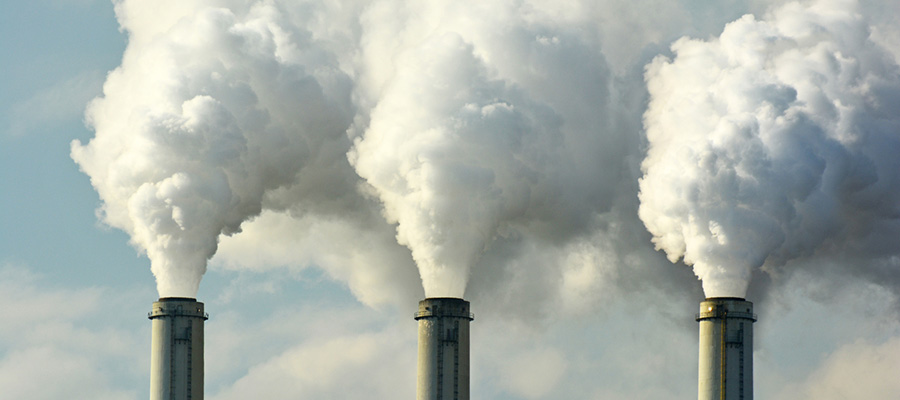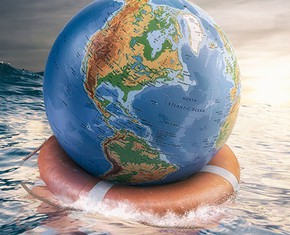The views expressed in our content reflect individual perspectives and do not represent the authoritative views of the Baha'i Faith.
The world’s polar regions are melting—what does that mean for humanity?
While those of us in the environmental community have been raising concerns for decades about climate change due to anthropogenic emissions of greenhouse gases, we never imagined that it would occur at the rates now being measured, especially in the polar regions.
The World Meteorological Organization (WMO) recently reported that our planet’s average temperature increased in 2016 to 1.1° Centigrade (2ᵒ Fahrenheit) above what was recorded in the pre-industrial era. Global temperatures have increased consistently since humans began burning massive quantities of fossil fuels when the industrial era began, at approximately the dawn of the 19th Century. The three hottest years on record—2014, 2015 and 2016—will likely be displaced in the record books by 2017, now on track to reach the highest average temperatures ever recorded.

While two degrees Fahrenheit may not seem like much, think about it this way: during the last Ice Age, global average temperatures only dropped by about 5° Centigrade—which covered much of Europe and North America with huge ice sheets. That’s why the Paris Climate Accords agreed to try and hold the rise in global temperatures to 2ᵒ Centigrade. We are already more than halfway there.
This rapid rise in the Earth’s temperature, explained by alarming evidence from the scientific community (IPCC 2007), combined with serious estimates of the economic cost of failure to act (Stern 2006), have now made this planetary issue a subject of serious debate at the highest political levels. The Paris Accords, ratified and in force more rapidly than any other such global treaty, amply demonstrated that fact. However, we know that scientific information, by itself, is inadequate to motivate action.
Faced with the inertia of economic, political and social systems, and powerful vested interests determined to maintain business as usual, the response to climate change falls far short of what scientists say is necessary. Economic and political thinking inherently focus on the short-term, while climate change happens gradually and has its most disastrous effects over the long term.
Unlike other global environmental problems like stratospheric ozone depletion, where the number of actors was limited and international agreement on control measures was possible, climate change threatens the very basis of the global economic system founded on the energy subsidy from cheap fossil fuels such as oil, natural gas and coal. This makes action to fix the problem very difficult, as it requires a global unity of purpose to undertake a fundamental transformation of human society. In addition, there are not just a few responsible parties—everyone is to some extent responsible for greenhouse gas emissions, with responsibility increasing as relative wealth and the rate of carbon consumption rises. Everyone also risks being a victim of climate change, with the poor the most immediately vulnerable. This raises a fundamental ethical dilemma that touches everyone.
Faced with the limitations of science to motivate change, we must consider what the other great knowledge system, religion (defined in its largest sense), can contribute to the response to climate change. The Baha’i teachings offer an organic view of the world and all of its living things:
Regard ye the world as a man’s body, which is afflicted with divers ailments, and the recovery of which dependeth upon the harmonizing of all its component elements. – Baha’u’llah, The Summons of the Lord of Hosts, pp. 79-80.
But science and religion are too often seen as antagonistic, with little to say to each other. Yet religion has traditionally given humanity its major source of motivation and ethical guidance. As the debate over climate change has intensified, and the scientific evidence has become overwhelming while sufficient action has not followed, it has become apparent that we need a broader approach. Religions and faith-based groups increasingly raise the ethical issues behind the climate change challenge, in complement to the scientific arguments. We need, then, an approach to this global conundrum that combines science and religion in one powerful force:
Given their tremendous capacity to mobilize public opinion and their extensive reach in the most remote communities around the world, religious communities and their leaders bear an inescapable and weighty role in the climate change arena. By many measures, increasing numbers of religious communities are consistently lending their voice and resources to efforts to mitigate and adapt to the effects of climate change–they are educating their constituencies, providing a scriptural basis for ethical action and leading or participating in efforts at the national and international levels. This role, however, must now unfold in the context of an emerging conversation–a rapprochement–between the discourses of science and religion. The time has come for the entrenched dichotomy between these two systems of knowledge to be earnestly re-examined. Both are needed to mobilize and direct human energies to the resolution of the problem at hand: methods of science facilitate a more objective and systematic approach to problem solving while religion concerns itself with those moral inclinations that motivate action for the common good. In an age yearning for justice and equality, religious doctrines will need to be carefully examined. Those that encourage social exclusion, passivity or inequality between the sexes will fail to engage the peoples of the world while qualities of justice, compassion, trustworthiness, humility and generosity–common to all religious traditions–will be even more urgently needed to forge the patterns of progressive community life. – The Baha’i International Community, Seizing the Opportunity: Redefining the Challenge of Climate Change, 2008.
You May Also Like
Comments

















Our task as Baha'is is to rebuild the relationship in a new way perhaps by way of response to the Revelation of Baha'u'llah.